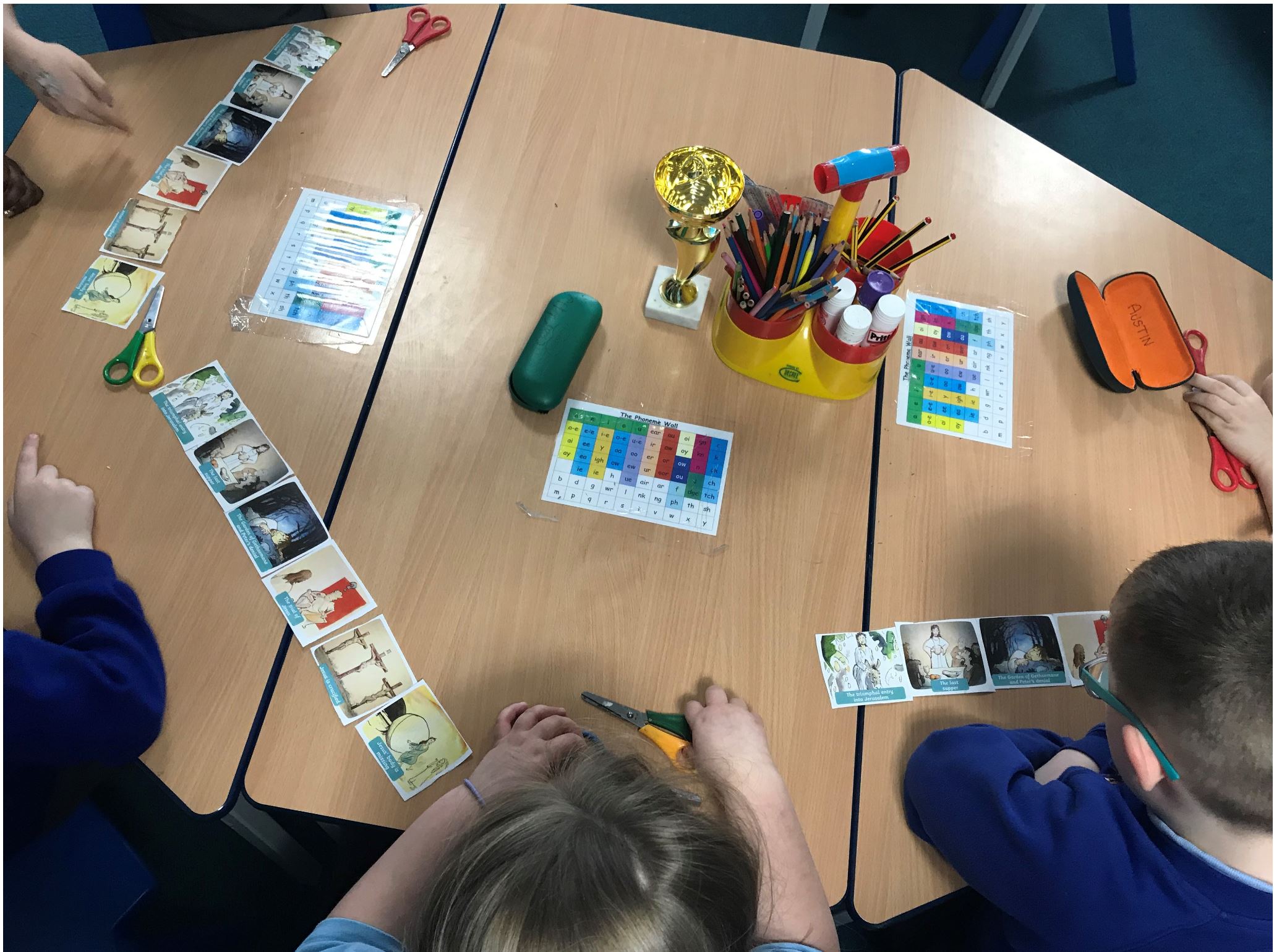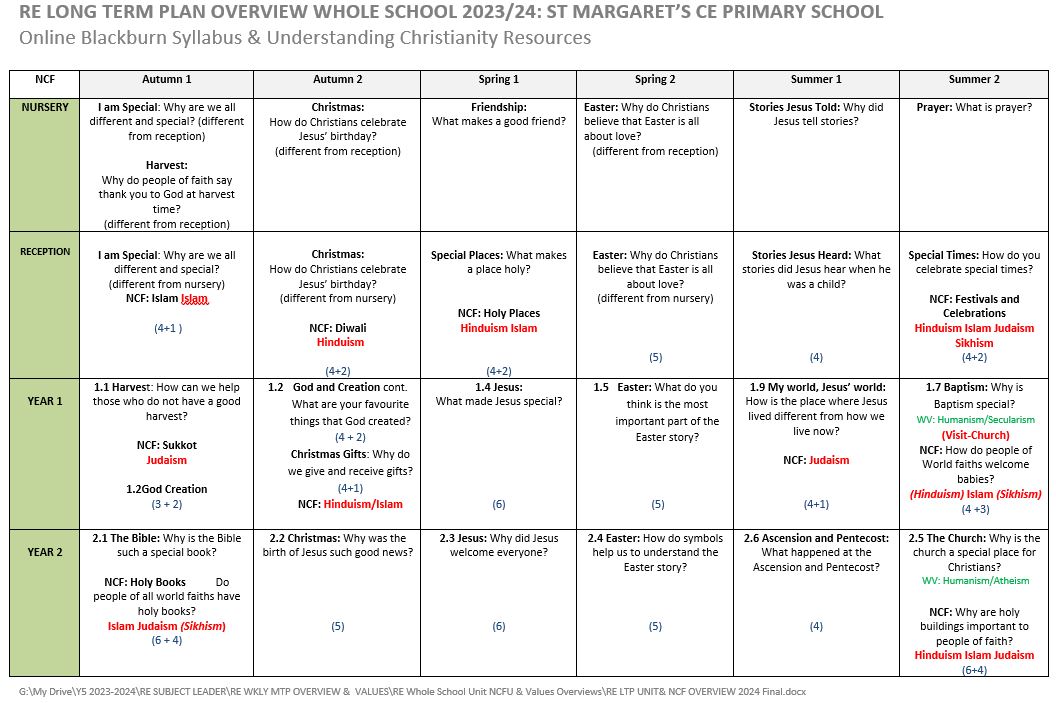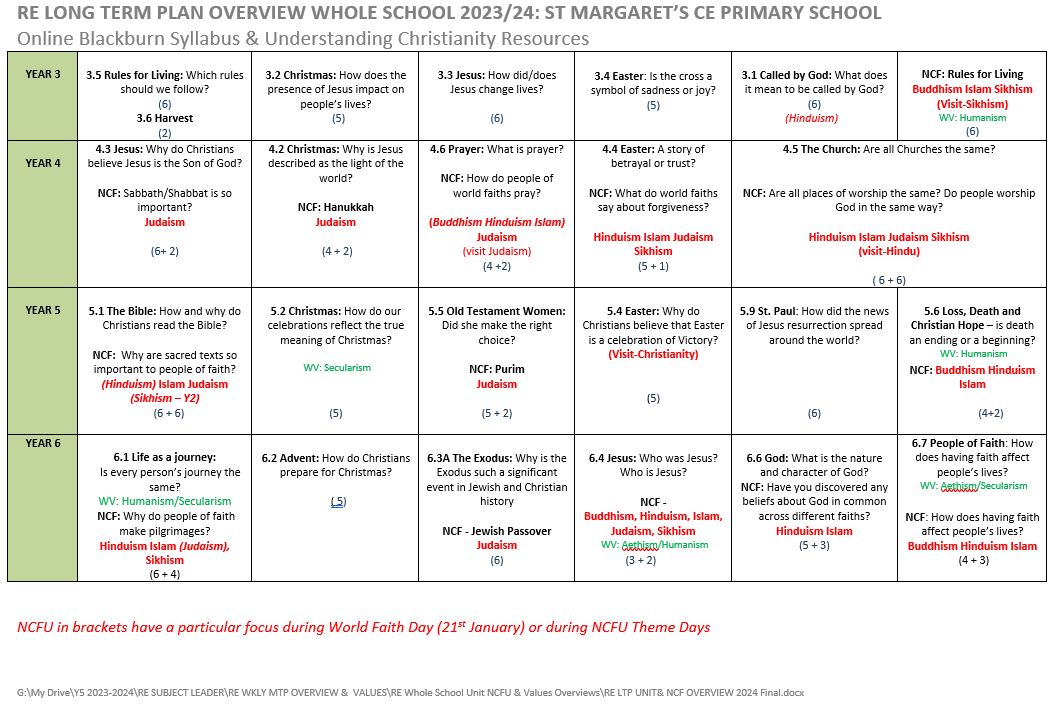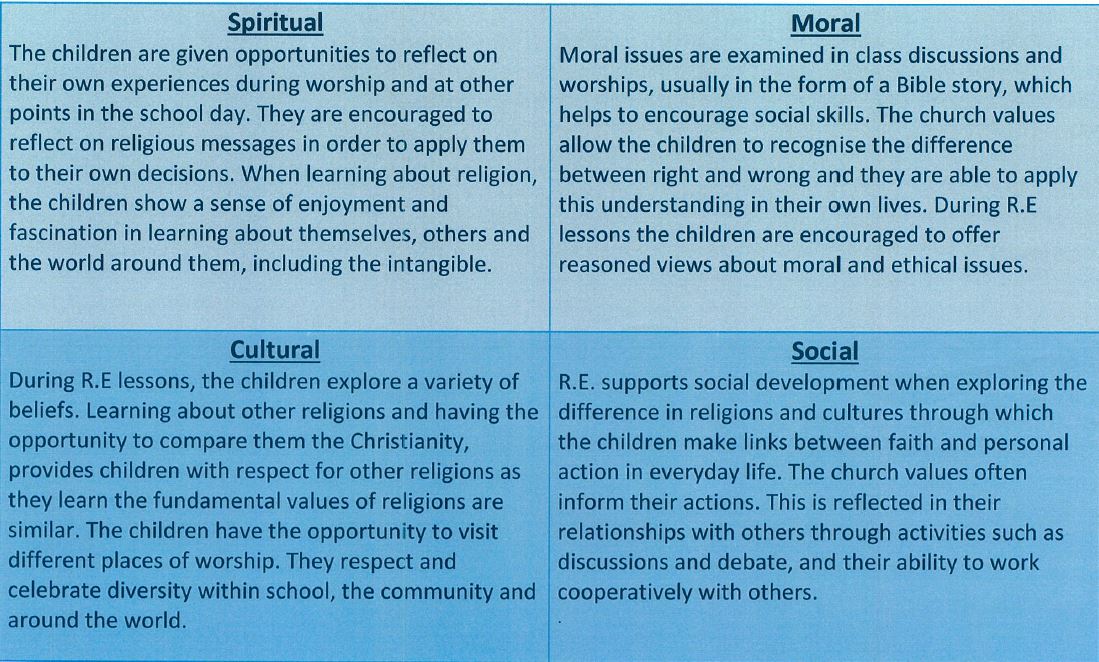Religious Education Curriculum
Religious Education is the bedrock of our curriculum as a Church School that was establ ished by Trust Deed. We therefore treat this as one of our priority subject areas.
ished by Trust Deed. We therefore treat this as one of our priority subject areas.
The school follows the latest version of the Blackburn Diocesan Syllabus released in September 2022, and implemented following training in January 2023 in school, which is the approved and adopted syllabus by the Liverpool Diocesan Board of Education.
A copy of the current syllabus can be found here: CURRENT DIOCESAN RE SYLLABUS
We are using the national support material being released by the Church of England National Office and RE Today; Understanding Christianity as well as being part of a pilot from October 2023 with the national CofE Education Office called Christianity as a World Faith.

a. Who leads this subject?
RE Subject Specialist/Champion: Marie Taylor
Subject Team Governor: Ann Elphick (Chair of Governors)
Part of the CDH (Christian Distinctiveness and Humanities) Team)
Parents are welcome to come and meet with either Mrs Meager, our Head of School, who leads on Collective Worship or Mrs Taylor who is our RE Subject Leader to discuss the contents of the syllabus.
Please see the information at the end of this page that explains the statutory requirements for withdrawal , and our prospectus that explains and how parents may withdraw their child from receiving Religious Education. However it is essential that parents meet with us in school so they can make an informed decision and we can understand how best to meet your child's needs. It should be noted that in application to this school you have chosen for your child to attend an Anglican Church School and that the school has expectations in response to this in terms of participation in school life and the curriculum.
b. Religious Education Curriculum Intent (RE Entitlement)
Distinctively we encourage our RE curriculum to deliver the aims and objectives of the 2019 CofE RE Entitlement:
-
To know about and understand Christianity as a diverse global living faith through the exploration of core beliefs using an approach that critically engages with biblical text.
-
To gain knowledge and understanding of a range of religions and worldviews appreciating diversity, continuity and change within the religions and worldviews being studied.
-
To engage with challenging questions of meaning and purpose raised by human existence and experience.
-
To recognise the concept of religion and its continuing influence on Britain’s cultural heritage and in the lives of individuals and societies in different times, cultures and places.
-
To explore their own religious, spiritual and philosophical ways living, believing and thinking.
A copy of the latest national RE Entitlement may be found here: https://www.churchofengland.org/sites/default/files/2019-02/re-statement-of-entitlement-for-church-schools.pdf
This includes:
- how the entitlement links to the national CofE education vision ( enable every child to flourish and to live life in all its fullness. (John 10:10))
- what the provision, profile and priority should be for RE in church schools
- how the curriculum should be challenging, accurate and diverse
- the balance and time provided that needs to be sufficient, appropriate
- how to develop the expertise and knowledge of staff
- the role of the diocesan board of education, and
- the support provided for effective and excellent RE
c. How is RE organised?
The Governing Body has authorised the school to teach the Blackburn Diocesan RE Syllabus (Questful RE). They have chosen this as:
- it is recommended as a syllabus by Liverpool Diocese
- the school and its teachers can benefit from in-service training from Blackburn relationships with Liverpool and Chester Diocese
- the content is relevant (updated January 2023) and meets the needs of our pupils (includes knowledge and examples from different faiths and Christianity around the world)
- we can 'own the curriculum' and make relevant to our setting (through disciplinary knowledge) and includes Early Years
The syllabus is delivered in units as set out below:
“No other aspect of school life can ensure better than RE that school is experienced by staff and students alike not as a fact factory but as a laboratory for learning the values and virtues, attitudes and aptitudes which make for the wholeness of body, mind and spirit,” (Saxbee 2013)
The school and Liverpool Diocesan Board of Education believes that high quality Religious Education (RE) is the key to enabling every child to flourish. We are committed to using quality resources that will provide teachers with the knowledge and skills they need to ensure that the children experience the best RE curriculum.
This RE syllabus is a revision of ‘Questful RE’ the Blackburn Diocesan Board of Education RE syllabus 2017. Building on the foundation of the 2007, 2013 and 2017 syllabuses we have updated and redesigned the content, bringing it in line with current best practice and pedagogical strategies.
By embracing the explicit teaching of Christian concepts and God’s big salvation story, it is hoped that the content of this syllabus will give pupils a deeper understanding of Christianity. In addition, pupils explore all major world faiths and discuss world views where appropriate.
Whoever we are, wherever we live, whether we are a person of faith or not, we all have a view on the world. Nobody stands nowhere.https://youtu.be/AFRxKF-Jdos
Quality RE has the potential, more than any other subject, to have the most powerful and lasting effect on the child’s heart and mind. It is a subject that combines academic rigour with the development of the character and spirit of the child. RE provides opportunities for spiritual development and personal reflection. On a quest to discover more about religion and world views pupils will discover more about themselves. As RE develops children’s knowledge and understanding of the nature of religion and belief, it provokes challenging questions about meaning and purpose, truth and values, identity and belonging. Pupils will experience, explore and encounter a wide range of creative and challenging multi-sensory activities that will help them to discover the answers to fundamental questions such as these: –
- Who am I and what does it mean to be me?
- In what ways do/can I relate to others?
- How/where can I encounter God?
- How can I make a positive contribution to the world in which I live?
- What values, attitudes, beliefs and behaviour are important to me?
- What does it mean to have faith?
- Who/what influences and inspires me?
Through an open investigative enquiry approach the pupils will be given the sense of being on a quest of discovery. A key feature of the syllabus is the large number of questions included in each unit. The purpose of these questions is to give pupils opportunity to investigate, reflect, evaluate and make meaning. In doing so they will discover more about themselves, their relationships with others, their relationship with the world around them and their relationship with God. The questions set the route through the curriculum content.
The curriculum content is a balance of the three essential disciplines of quality RE, Theology, Philosophy and Social Science. This means pupils will look at concepts through a theological lens, exploring what people of faith believe. Alongside this pupils will explore questions and answers raised in relation to the lived reality and impact of religion and world views on people’s lives. They will also think like philosophers, and be equipped with the skills that will enable them to make sense of life’s experiences.
RE prepares children for citizenship in today’s diverse society. It enables them to develop sensitivity to, and respect for others. Through authentic encounters with living faith communities, pupils will develop diversity dexterity and be equipped with the ability to hold an informed conversation about religious beliefs and practices.
The teaching of RE is both a huge responsibility and a privilege that must be recognised by those who teach it. https://youtu.be/6NTW2bsFTLY
As a school we use Questful RE as our core, underpinned and supported by Understanding Christianity . In 2023 we are also weaving into our syllabus material from the national Church of England pilot programme 'Christianity as a World Faith' that complements Understanding Christianity thinking.
f. RE Knowledge Boards (incl Progression in Disciplinary Knowledge)
Some aspects of our teaching are single subject based but our integrated subject approach ensures that we have the National Curriculum Coverage.
Our knowledge boards have been designed by our curriculum team of experts and secures the coverage and progression through our school.
RE Knowledge Board:
g. Spiritual, Moral, Social and Cultural education in Religious Education
h. The Right to Withdraw from RE
Please see school prospectus for specific details how to withdraw your child.
Statutory duties: The use of the right to withdraw should be at the instigation of parents (or pupils themselves if they are aged 18 or over), and it should be made clear whether it is from the whole of the subject or specific parts of it. No reasons need be given.
Statutory guidance allows a parent to withdraw their child from a specific activity, such as a visit to a place of worship, and not to withdraw the child from the remainder of their RE.
Parents have the right to choose whether or not to withdraw their child from RE without influence from the school, although a school should ensure that parents or carers are informed of this right and are aware of the educational objectives and content of the RE syllabus. In this way, parents can make an informed decision.
If pupils are withdrawn from RE, schools have a duty to supervise them, though not to provide additional teaching or to incur extra cost. Pupils will usually remain on school premises. Where a pupil has been withdrawn, the law provides for alternative arrangements to be made for RE of the kind the parent wants the pupil to receive. This RE could be provided at the school in question, or the pupil could be sent to another school where suitable RE is provided, if this is reasonably convenient. If neither approach is practicable, outside arrangements can be made to provide the pupil with the kind of RE that the parent wants, and the pupil may be withdrawn from school for a reasonable period of time to allow them to attend this external RE. Outside arrangements for RE are allowed as long as the LA is satisfied that any interference with the pupil’s attendance at school resulting from the withdrawal will affect only the start or end of a school session. (Non-statutory Guidance 2010) (Blackburn Diocese)










 Tweets by @smceps
Tweets by @smceps